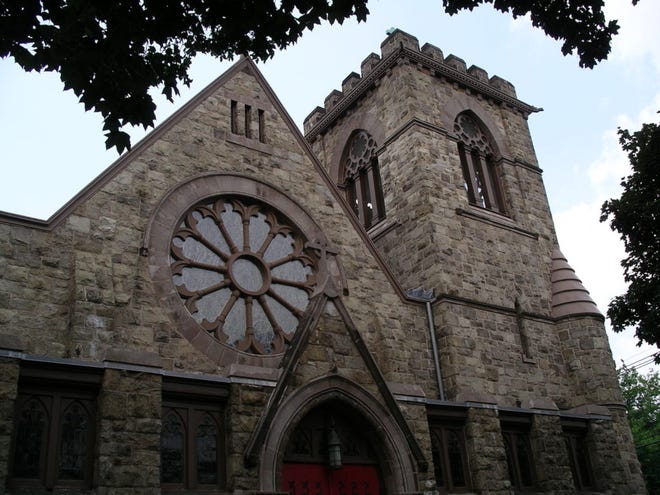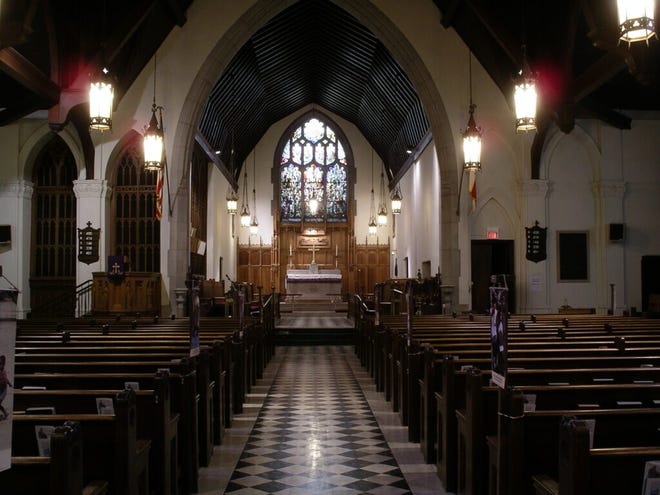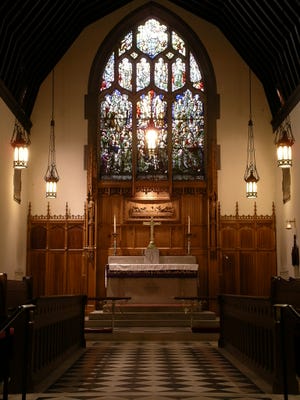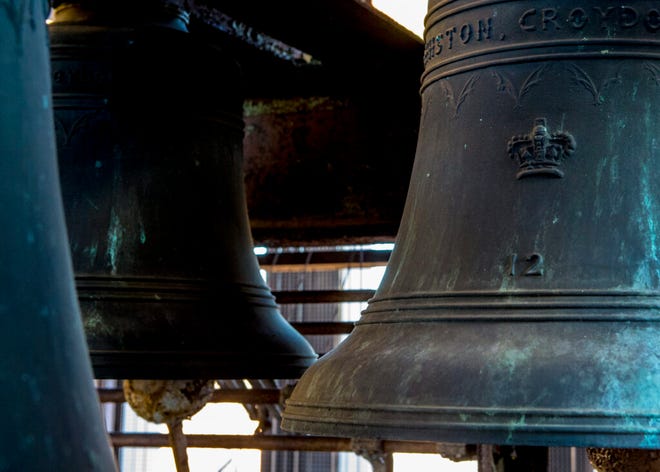Article published by mycentraljersey.com on September 6, 2022.
Historic Plainfield church’s future uncertain amid planned changes to preservation efforts
PLAINFIELD – Barbara Habeeb fondly recalls attending functions at Grace Episcopal Church when she was a child.
“I have a lot of memories from Grace Church. I made a lot of friends when I was young. I remember getting dressed up at Easter to go to church. At Christmas time they would have pageants. My uncle, the one we just buried two years ago, he played one of the “Three Wise Men.” That was a big thing when I was a kid. I was always thrilled that my uncle was in it,” said Habeeb, a North Plainfield resident whose family has belonged to the church since 1956.
It’s partly because of those cherished memories that Habeeb and others are upset over the church’s 2020 decision to sell the 130-year-old Gothic Revival-style building at 600 Cleveland Ave. following decades of diminished attendance, decreased income, building conditions and the inability to afford critical repairs which could cost millions.
The total average yearly pledge was about $87,000, but in 2021 pledges only amounted to $34,000 when the church’s yearly expenses are more than $225,000, according to the church website.
Habeeb only learned about the sale from another church member. She was never directly contacted though she had regularly pledged money and had attended her uncle’s funeral at the church just before the COVID-19 pandemic.
“It’s really breaking my heart,” she said. “I was angry and then I was sad too at the same time.”
The Episcopal Diocese of New Jersey approved the decision to sell the building and a plan is underway to merge Grace Church with St. Mark’s Episcopal Church in Plainfield.

Petitioning to save the church
A Change.org petition called Save Grace Church of Plainfield, NJ created by Elizabeth Faraone opposes attempts to sell the church for $5 million to a developer who apparently wants to dismantle it to build apartments because it is not far from the train station.
The petition seeks the return of the church’s Tiffany-stained glass windows that were sold. The petition, which has more than 1,200 signatures, also asks the church to work with Partners for Sacred Places to transition the building so it can be preserved.
“I don’t want to see Plainfield lose this wonderful church. There really is the possibility to sell it to another church, but also to preserve it and convert it into another use,” said Faraone.
The church is listed on the both the state and national Register of Historic Places and had windows donated by a member of the Tiffany family, she said.
“There is just so much historical significance in general. It’s a very important church,” said Faraone, who grew up in Plainfield and has a relative who is a church member.
She said the building does have some asbestos around pipes but it’s not throughout the church. Tiles in the church have not been tested to determine if they have asbestos.
“It’s not a blighted building at all,” she said, adding the church which initially closed due to COVID-19 has never reopened for in-person services but continues to provide virtual services and meals to needy residents.
Earlier this summer the city Planning Board rejected a blight designation for the church that would have made it ripe for redevelopment.
Faraone is aware of an April contract to sell the church and its carillon to a developer who was looking to demolish the existing buildings on the site and build 175 fair-market residential units. The contract was contingent on all government approvals needed to demolish the church building, located in an area not zoned for residential or commercial use, and would require zoning board and Historic Preservation Commission approval, she said.
“All decisions regarding the possible sale of Grace Plainfield are being made by the active congregation at Grace, not by the Diocese of New Jersey, and all proceeds if any will be used to enhance ministries to the surrounding Plainfield community,” said Steve Welch, canon of communications for the Episcopal Diocese of New Jersey.
Welch referred questions about the church to warden of the congregation, Jason Algeo. Neither Algeo nor Warden Karen Moore responded to email requests for comment.
Plainfield Mayor Adrian Mapp issued a statement Tuesday afternoon supporting the church.
“The City of Plainfield doesn’t own, nor does it have any control over the future disposition of Grace Church. My administration has never gotten involved in the sale of any private property to third parties, and Grace Church is no exception, the statement said. “Having said all of the above, I can say without reservation, that neither my administration nor me will ever support the demolition of Grace Church. I encourage the members of Grace Church to be fierce advocates with the Diocese for whatever action they view to be in the best interest of preserving the historic edifice.”
According to the church website, neither the federal nor state Historical Register listings can stop a private owner such as Grace from selling or altering a property unless the owner has a grant from the Historical Trust that imposes an unexpired easement.

In addition, the church website states buildings in areas regulated by the Plainfield Historic Preservation Commission (HPC) can have a change in ownership, but changes to their exterior appearance must have the commission’s approval. The commission can approve demolition of a building if restoring it to code is not economically feasible or if a replacement building would make the city a more desirable place to live.
Changes proposed to the Historic Preservation Commission
Unknown is whether any proposed changes to the Historic Preservation Commission will have any impact on the church.
On Sept. 12 the Plainfield City Council is scheduled to hold a public hearing on an ordinance aimed at changing the responsibilities of the HPC. Faraone is concerned the changes would allow a developer to bypass the HPC, tear down the church and build 175 apartments.
“Of great concern right now is that the city may try to bypass HPC for partial or total destruction of Grace Church and its carillon, by invoking the municipal exemption part of the amendments. Once the amendments pass, sale of the church would be completed, and a destruction development plan would be put into action,” she said.
Habeeb, too, believes the city wants the church gone by taking away power from the HPC which then won’t be able to protect it from being demolished.
“That’s what makes me afraid that we’re going to lose that building. That building is special, not just because of the memories, but because it’s a beautiful historic building and you’re not going to get that kind of Gothic architecture and you’re not going to get the carillon, which is one of the few in the country, a premier carillon and also the pipe organ that is inside the building is another premier pipe organ. That building has a lot of history that is just going to be gone just like the Tiffany windows that got sold,” Habeeb said.
Habeeb said she always thought the church would be protected because of the status on the historic registers, but she has since learned they have no jurisdiction.
Also see:Plainfield ordinance alters Historic Preservation Commission’s role
Neither William Michelson, chairman of the Plainfield Historic Preservation Commission, nor Councilman Sean McKenna know what impact the council’s amendments to the HPC ordinance will have on Grace Church.
Michelson said he doesn’t think the amendments will make it easier for the building to be demolished.
“We have to approve demolitions as well as we have to approve approvals. We don’t have the power to make the city stop it if they want to send bulldozers out there, we will all scream until our faces turn blue, but we have no power to stop it. The only way we can challenge it is by going to Superior Court, but the city won’t pay for it and who else is going to pay for it?” he said.
Michelson, who also serves on the Preservation New Jersey Board of Directors, said churches face the biggest threats to preservation nationwide. While churches are often the most beautiful, interesting buildings in a town, they are totally dependent on having a functioning congregation.

“The buildings are often unsuitable to be put to any other use. In an apartment or office building, ceilings are 8 or 9 feet high and then you have another floor above that and another 8 or 9 feet and however many floors you can fit in a building. A church is not like that. The ceiling is 50 or 60 feet up and there is nothing in between. So that’s our biggest fear,” he said.
Michelson said the planned changes to the HPC take away certain powers, but don’t destroy the HPC.
“They don’t want us to have informational meetings anymore, they don’t want us to give committee approvals on minor work. The people that have been wanting to do things with their properties, they love it. We make it possible for them to do it fast, cheap and easy instead of having to have a formal hearing with notice to the neighbors because their porch needs some new lumber. Why they would want to take that away is beyond me,” he said. “The part that bothered me the most is where you have a case that comes before us and is also going to be before the planning or zoning board, they want to knock us out of that process.”
Michelson does see a need to make the process more streamlined when an applicant has to come before both the HPC and either the planning or zoning board.
“The point is to make our HPC just like the toothless HPC’s in 100 other towns because we have a strong ordinance where we have actual authority over a number of things, and most towns in New Jersey don’t have that. They have a weak ordinance where the commission may be advisory only and has no power whatsoever or at most they have some power over design features, architectural details,” he said.
He said the church, rather than the former YMCA, should be the site of the planned Center of Excellence, a youth cultural and education center, because that site has room that would suit that purpose.
Also see:Plainfield approves YMCA purchase paving way for youth center
McKenna said he doesn’t know what impact the changes to the HPC will have on the church, which is within his ward.
“The general concern I have is that it waters down the authority of the Historic Preservation Commission and it puts so much of the authority on where decisions should be made that I think it does put Grace Church property in some potential jeopardy from preservation,” McKenna said.
McKenna said the administration has said at previous council meetings that it will not allow Grace Church to be destroyed or demolished. But he said he doesn’t have faith in those statements.
While the church is on large parcel, he’s unsure if the mixed-use residential project could be built without demolishing the church.
The Grace Church bell system
A Save Grace Church from demolition website also stresses the need to preserve the carillon which dates to the 1920s and was donated by the Pittis family.
Jeff Spelman, a longtime city resident, played the church carillon for six or seven years.
“There are 47 bells in the tower. The early bells date back to the 1920s and the instrument was doubled in size to the 47 bells in the 1970s. It’s one of only four carillons in the State of New Jersey. It’s a true treasure to Plainfield. It’s part of Plainfield’s rich cultural history especially in the arts and music,” Spelman said.

The carillon is played from a keyboard one floor beneath the bell chamber in the tower. The keys are struck with a half-closed hand. In addition, the larger bells are connected to foot pedals. Individual cables connect each bell to the keyboard. The bells remain stationary. The wire pulls the clapper into the bell. The largest bell weighs 2,296 pounds and is over 5 feet tall, according to the Save the Grace Church website.
Spelman said he has not been able to get access to the bells. He’s put in requests because the bells need some general maintenance, such as lubrication, but he hasn’t received a response from the remaining church leaders.
“It’s such a sad thing. I was active in that church for quite some number of years, and we got married in the church and we stopped going when the church leadership had gone through a lot of troubles in the last several years. I’m just so disappointed that there has not been the forum with the diocese to engage with many interested community members to trade views of the church and how the church can blend with new things coming,” he said. “We reached out to the bishop and wrote letters and there is no response which I think is just horrid for a facility that’s been there for 130 years.”
Email: srussell@gannettnj.com
Suzanne Russell is a breaking news reporter for MyCentralJersey.com covering crime, courts and other mayhem. To get unlimited access, please subscribe or activate your digital account today.
